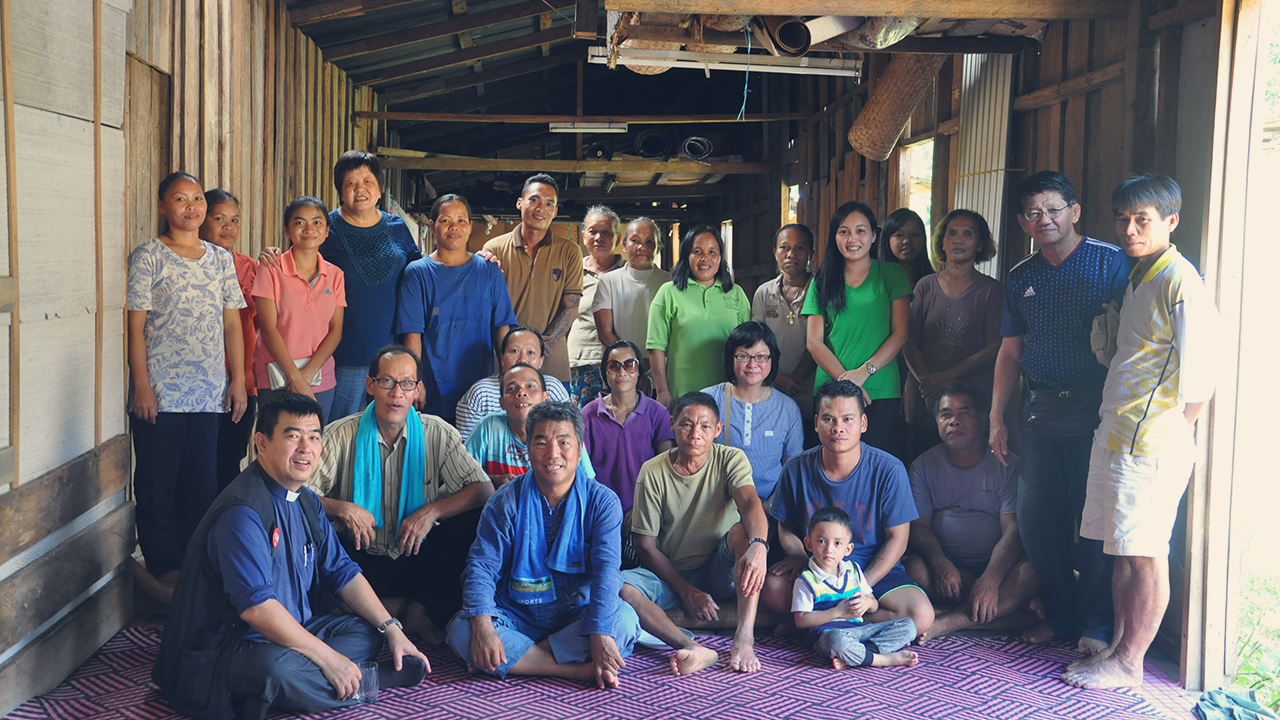THE VOICE OF MISSIONS IN THE SUBURBAN LONGHOUSE
郊区长屋宣教的呼声
郊区长屋宣教的呼声
written by BOE local missionary, Pastor Jason Siew
Evangelism is the responsibility of every Christian, because there is no so-called “gift of evangelism” among the various types of gifts listed in the Bible. Therefore, every Christian should seize the opportunity to share the gospel with others everywhere. Each church should also team up with individual Christians to create opportunities for evangelism, whether in cities or suburbs.
Several aspects of mission Let me share some aspects of missions in the local suburbs. In fact, there is not much difference between suburban and urban missions. The basic principles of the two are the same, but the practical application needs to be adapted to local conditions. First, we need to think about some of the problems faced by the church itself or missionaries who want to engage in missions in the suburban longhouse, including the established problems in the mission field:
Evangelism is the responsibility of every Christian, because there is no so-called “gift of evangelism” among the various types of gifts listed in the Bible. Therefore, every Christian should seize the opportunity to share the gospel with others everywhere. Each church should also team up with individual Christians to create opportunities for evangelism, whether in cities or suburbs.
Several aspects of mission Let me share some aspects of missions in the local suburbs. In fact, there is not much difference between suburban and urban missions. The basic principles of the two are the same, but the practical application needs to be adapted to local conditions. First, we need to think about some of the problems faced by the church itself or missionaries who want to engage in missions in the suburban longhouse, including the established problems in the mission field:
- Unrecognized opportunity: Many Christians may not be aware of the urgent need of the gospel work in the suburbs, or even think that it is a secondary, less urgent need. In fact, the crops in these suburbs are mature and ready for harvest, but workers are scarce.
- Lack of enthusiasm: Some brothers and sisters may be good leaders, but they may not be burdened with missions in the suburban longhouse, so that the members do not have this vision and burden. God has given the church different gifts, and these gifts should complement each other in longhouse missions.
- Education in the suburbs: Residents of longhouses in the suburbs are less educated than those in the cities, so they need to be cultivated in a way that they can understand, especially in their mother tongue. Encourage them at the same time: God loves to choose non-intellectuals and humble people to participate in His work.
- Familiarity is an obstacle: In general, longhouse neighbors know each other better than people living in the city. The paradox is that the more familiar, the more embarrassed to share Jesus Christ with each other. However, they have the advantage of grasping the best time to share the gospel with their neighbors.
- Participation of lay believers: Christians in suburban longhouses need to be trained to be leaders of longhouse worship. Fortunately, longhouse worship services can continue when the pastors cannot come to preside. There should be a worship leader in every longhouse. Urbanization makes the long house “aging”
- Time challenge: Another challenge of longhouse missions is the time limit for contacting them. This is because they are mostly farmers and work in the fields during the day, leaving only night time. This makes us difficult to hold teaching such as bible study, other training sessions and gathering during the day.
- Past neglect: In fact, the longhouse people in the suburbs have existed for a long time, but our church has not been able to share gospel among them. They are a neglected group, and we can no longer ignore their salvation needs and our responsibilities.
- The challenge of distance: The suburban longhouses are generally far away from the city and scattered inland. Traffic and long distance naturally pose a certain degree of challenge. In addition to the long distance, the road conditions are mostly poor, usually only four-wheel drive vehicles can be used, and sometimes you have to walk for several hours to get there. Some suburbs can only use water, and the journey also takes several hours. In the dry season, you often have to go down into the river to pull a long boat. All these have doubled the difficulties and transportation costs of longhouse missions.
- Children’s Sunday School: Frankly speaking, the children’s Sunday school ministry in Longhouse is not easy and effective; this is because children usually in school hostels, so they can only be conducted during school holidays, and therefore it is difficult to have continuity. Coupled with the gap in age and understanding, it also causes problems in teaching.
- The impact of urbanization: Many longhouse residents “immigrate” to cities for work or study, leading to the “aging” and “empty nests” of suburban longhouses. Many longhouses have only elderly people and children left. Nowadays, even during school holidays, parents will take their children to the city to see the world, so that the longhouse is only popular and crowded during special festivals such as Harvest Festival and Christmas.
Bring peace to the longhouse through short-term mission.
Even so, these factors also contribute to the uniqueness of longhouse missions in the suburbs, and the methods of urban missions cannot be followed. We should treat these factors as challenge to prove the validity of the gospel.
Even though there are many difficulties, we must still be determined to bring peace to every longhouse in every short-term mission. We must preach about Christ, train young leaders, help the needy, care for the weak, and teach the next generation.
Let us remember that the Word of God is lively, effective, faster, more powerful than any two-edged sword. Let us follow the example of the apostle Paul, who said in Romans 1:16: “For I am not ashamed of the gospel of Christ: for it is the power of God unto salvation to every one that believeth; to the Jew first, and also to the Greek.”
Let us look for God through prayer and ask Him to help us and lead us to overcome every difficulty appropriately.
Let us continue to move forward and feed the thirsty spiritual needs of the longhouse dwellers with God’s word, so as to achieve what Jesus said in John 6:35, “I am the bread of life. Whoever comes to me will never go hungry, and whoever believes in me will never be thirsty.“
Longhouse residents in the suburbs need Jesus Christ! But if they don’t tell them the gospel of Jesus, how can they hear and know about Jesus Christ? “14 How, then, can they call on the one they have not believed in? And how can they believe in the one of whom they have not heard? And how can they hear without someone preaching to them? 15 And how can anyone preach unless they are sent? As it is written: “How beautiful are the feet of those who bring good news!?” (Romans 10:14-15)
Even so, these factors also contribute to the uniqueness of longhouse missions in the suburbs, and the methods of urban missions cannot be followed. We should treat these factors as challenge to prove the validity of the gospel.
Even though there are many difficulties, we must still be determined to bring peace to every longhouse in every short-term mission. We must preach about Christ, train young leaders, help the needy, care for the weak, and teach the next generation.
Let us remember that the Word of God is lively, effective, faster, more powerful than any two-edged sword. Let us follow the example of the apostle Paul, who said in Romans 1:16: “For I am not ashamed of the gospel of Christ: for it is the power of God unto salvation to every one that believeth; to the Jew first, and also to the Greek.”
Let us look for God through prayer and ask Him to help us and lead us to overcome every difficulty appropriately.
Let us continue to move forward and feed the thirsty spiritual needs of the longhouse dwellers with God’s word, so as to achieve what Jesus said in John 6:35, “I am the bread of life. Whoever comes to me will never go hungry, and whoever believes in me will never be thirsty.“
Longhouse residents in the suburbs need Jesus Christ! But if they don’t tell them the gospel of Jesus, how can they hear and know about Jesus Christ? “14 How, then, can they call on the one they have not believed in? And how can they believe in the one of whom they have not heard? And how can they hear without someone preaching to them? 15 And how can anyone preach unless they are sent? As it is written: “How beautiful are the feet of those who bring good news!?” (Romans 10:14-15)
布道宣教是每一个基督徒的责任,因为在各种恩赐类别中并没有所谓“布道的恩赐”。因此,每一个基督徒当随事随处把握机会与人分享耶稣的福音。各个教会也当与个别基督徒联手起来去创造布道宣教的机会,不论是在城市抑或郊区。
宣教的几个面向
容我在此分享本地郊区宣教的几个面向。其实,郊区宣教与城市宣教并无太大不同,二者的基本原则是一样的,倒是实践上的应用需要因地制宜。首先,我们需要思考教会本身或欲投入郊区长屋宣教的宣教士所面对的一些问题,包括宣教工场的既定问题:
在短宣中将平安带给长屋
纵然如此,这些因素也形成郊区长屋宣教的独特性,不能如法炮制城市宣教的方法。我们当视这些因素为证明耶稣福音有效性的挑战。
即使困难众多,我们仍要矢志在每一次的短宣中把平安带给每一间长屋。我们要宣扬基督,培训年轻的领袖,协助穷乏者,关顾软弱者,并教导下一代。
让我们记得上帝的道是活泼的,是有功效的,比一切两刃的剑更快、更大有能力。
让我们学效使徒保罗,并他在罗马书一16所说的:“我不以福音为耻,这福音本是上帝的大能。” 让我们透过祷告仰望上帝,恳求祂帮助我们、带领我们适切地跨越每一个难关。
让我们持续前进,用上帝的话喂养长屋居民饥渴的灵里需要,达至耶稣在约翰福音6:35所说的“我就是生命的粮。到我这里来的,必定不饿;信我的,永远不渴。” 郊区长屋居民需要耶稣基督!但如果不去向他们传说耶稣的福音,他们又怎么能听到并认识耶稣基督呢?“然而,人未曾信他,怎能求祂呢?未曾听见祂,怎能信祂呢?没有传道的,怎能听见呢?若没有奉差遣,怎能传道呢?如经上所记:报福音、传喜信的人,他们的脚踪何等佳美。”(罗马书十14-15)
宣教的几个面向
容我在此分享本地郊区宣教的几个面向。其实,郊区宣教与城市宣教并无太大不同,二者的基本原则是一样的,倒是实践上的应用需要因地制宜。首先,我们需要思考教会本身或欲投入郊区长屋宣教的宣教士所面对的一些问题,包括宣教工场的既定问题:
- 未认知的机会:许多基督徒恐怕还未意识到郊区福音工作的急迫需要,甚或认为那是次要的,比较不紧急需要的。事实上,这些郊区的庄稼也已经成熟了,可以收割了,只是工人稀少。
- 缺乏热忱:一些弟兄姐妹也许是个好领袖,却未必对郊区长屋宣教有负担,以致会友们也没有这个看见和负担。上帝赐给教会不同的恩赐,而这些恩赐也当在长屋宣教上相辅相成。
- 郊区教育问题:郊区长屋居民基于教育程度不如城市者,因此需要用他们能够明白的方式来作栽培,特别是用他们的母语来教导。同时勉励他们:上帝喜爱拣选非知识分子和谦卑的人参与祂的工作。
- 熟悉是阻碍:一般上,长屋邻居之间总比住城市的人更为彼此了解,吊诡的是越熟悉反而越不好意思跟对方分享耶稣基督。然而他们却有着掌握最佳时机向邻居分享福音的优势。
- 平信徒的参与:郊区长屋基督徒需要被训练成为长屋崇拜领袖,好在牧者不克前来主持的时候,长屋的主日崇拜能够继续进行。每一间长屋当有一个崇拜领袖。 城市化让长屋“老化”
- 时间上的挑战:长屋宣教的另一挑战是接触他们的时间限制,这是因为他们多是农夫,白天都在田里工作,只剩晚上的时间;这导致难以在白天举办讲座、工作坊、读经研经等训练会。
- 过去的忽略:其实郊区长屋居民久已存在,只是我们教会迟迟未到他们当中分享耶稣。他们是被忽略的一群,我们不能再漠视他们的救恩需要和我们的责任了。
- 距离的挑战:郊区长屋一般都远离城市且散布内陆,交通和远距自然造成一定程度的挑战。除了路途遥远,路况多为不佳,通常只能动用四轮驱动车,有时还得步行几个小时方能抵达。有些郊区甚至只能用水路,而且路程同样需要数个小时。到了旱季,往往还得下到河中拉长舟。这些都使长屋宣教的困难和交通费用加倍。
- 儿童主日学:坦白说,长屋的儿童主日学事工不易有效地进行;这是因为孩子们平时多寄宿学校,因此只能在学校假期期间进行,也因此难有连续性。加上年龄和理解程度上的差距,也形成教导上的困扰。
- 城市化的影响:许多长屋居民“移民”到城市或就业或求学,导致郊区长屋的“老化”和“空巢”,很多长屋多只剩长者和儿童。如今,甚至学校假期期间,父母们也会带孩童们往城市去看世界,以致长屋只有在特别节期如:丰收节、圣诞节时才有人气和人潮。
在短宣中将平安带给长屋
纵然如此,这些因素也形成郊区长屋宣教的独特性,不能如法炮制城市宣教的方法。我们当视这些因素为证明耶稣福音有效性的挑战。
即使困难众多,我们仍要矢志在每一次的短宣中把平安带给每一间长屋。我们要宣扬基督,培训年轻的领袖,协助穷乏者,关顾软弱者,并教导下一代。
让我们记得上帝的道是活泼的,是有功效的,比一切两刃的剑更快、更大有能力。
让我们学效使徒保罗,并他在罗马书一16所说的:“我不以福音为耻,这福音本是上帝的大能。” 让我们透过祷告仰望上帝,恳求祂帮助我们、带领我们适切地跨越每一个难关。
让我们持续前进,用上帝的话喂养长屋居民饥渴的灵里需要,达至耶稣在约翰福音6:35所说的“我就是生命的粮。到我这里来的,必定不饿;信我的,永远不渴。” 郊区长屋居民需要耶稣基督!但如果不去向他们传说耶稣的福音,他们又怎么能听到并认识耶稣基督呢?“然而,人未曾信他,怎能求祂呢?未曾听见祂,怎能信祂呢?没有传道的,怎能听见呢?若没有奉差遣,怎能传道呢?如经上所记:报福音、传喜信的人,他们的脚踪何等佳美。”(罗马书十14-15)
Categories
- 原住民事工活动
- 民都鲁 Bryan宣教士
- Selidap (述恩楼)
- LONG MALIN & LONG WAT
- BOE NEWS
- Sharings
- Obey Him when you don’t know 在你不晓得的时候顺服祂
- Is it possible that our team will go to another place together to hold another camp again? 有没有可能我们这一班人马再一起到别的地方再办一场营会?
- Lift up your eyes, and look on the fields; For they are white already to harvest. 举目向田观看,庄家熟了!
- Become that hornbill and revive Sarawak! 成为那犀鸟,复兴砂拉越!
- Being baptized = “Basuh Kepala”? 受洗 = 洗头?
- Go out to sow! 出去播种!
- No one come to shepherd us 没人来牧养我们
- The CKS flame cannot be extinguished when it is lit CKS火焰点了就不能熄灭,且不能熄灭。
- The voice of missions in the suburban longhouse 郊区长屋宣教的呼声
- Contact → Evangelism → Cultivation → Service → Inheritance 接触→ 传福音→ 栽培→ 服事→ 传承
- Promote Daniel’s plan! 推动但以理计划




